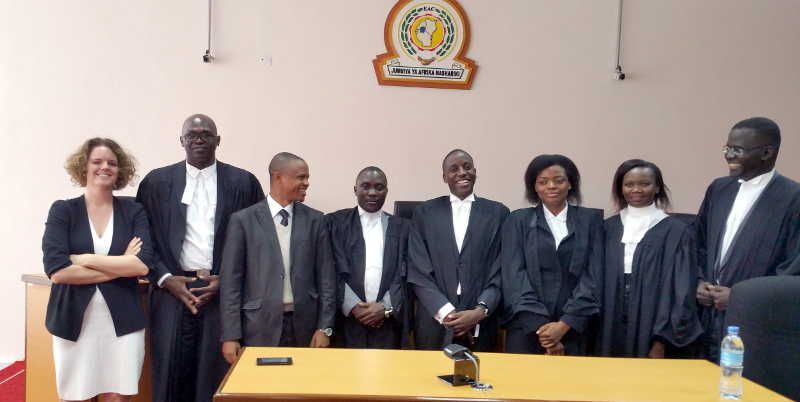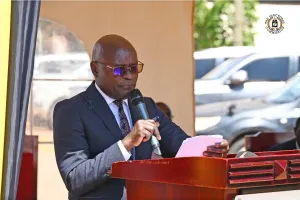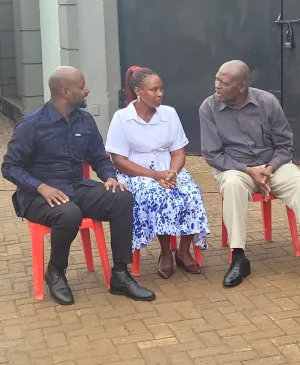

R-L: The late Ssembuusi’s lawyers Nicholas Opio, Catherine Anite of Oasis Advocates, Harriet Nalukenge, Jeffrey Atwine, Ojambo Bichachi representing the Attorney General of Uganda, Tanzanian Advocate William Ernest representing the United Nations and African Union, Ugandan Lawyer, Gimara Francis and Alinda from UK representing MLDI and 19 others.
The East African Court of Justice based in Arusha has allowed twenty national and international to be party to a case challenging criminal defamation law in Uganda.
In a unanimous ruling by five judges of First Instance Division of the EACJ delivered on 28 June 2016 in Arusha the court said: “… we take the view that the justice of this matter dictates that the Court do benefit from the Applicants’ apparent expertise in the issues under scrutiny in the substantive Reference. We do therefore, allow this application and hereby grant the Applicants leave to be joined as amici curiae.”
Honorable Justice Audace Ngiye who read the ruling said the organizations are “… hereby granted leave to submit a joint Amicus Brief (friendly submission) in writing in Reference No 16 0f 2014 within such a time frame as shall be directed by the court.” He said the brief shall be restricted to issues within the organizations mandate and of specific relevance to the matter before court.
In June 2015, Media Legal Defence Initiative media rights organization based in UK and 19 other organizations filed an application seeking to be added as friends of court in matter a radio journalist, the late Ronald Ssembuusi, is challenging the continued use of criminal defamation in Uganda.
Other organizations are: Africa Freedom of Information Centre, Article 19 Eastern Africa, Centre for Human Rights of the University of Pretoria, Centre for Media Studies and Peace Building, Centre for Public Interest Law, Committee to Protect Journalists, Foundation for Human Rights Initiative, Freedom of Expression Institute, Ghanaian PEN Centre, Human Rights Network-Uganda, Media Council of Tanzania, Media Rights Agenda, Media Institute of Southern Africa, Pan African Lawyers Union, PEN International, PEN Sierra Leon, PEN South Africa, PEN Uganda and World Association of Newspapers and News Publishers.
In November 2015 the court granted permission the AU and UN special rapporteurs on freedom of expression to join the case as friends of court.
The judges said the court will benefit from the organizations expertise in the issues under scrutiny but warned that they sever the friendship if the organizations seeks to influence the case. They noted that a ‘friend of court’ assists the court by providing information so that the court will not fall into errors, but dies not seek to influence the final outcome or attempt to persuade the court to adopt a particular view, whether or not he has a direct interest in the matter outcome
“It seems to us, therefore that whereas an amicus curiae must of necessity have some semblance of interest in a matter that would motivate it to apply to be joined therein in the first place, courts are at liberty to disregard amicus briefs that seek to influence the final outcome or attempt to persuade the court one way or another. For present purposes therefore, should this Court deduce a biased, irrational and un-researched premise for the positions advanced by the Applicants, it would be at liberty to sever its friendship with them and disregard the amicus brief,” the judges stated in their ten page ruling.
Gimara Francis, the Uganda Law Society President, represents the 20 organizations while Catherine Anite and Nicholas Opiyo represent the late Ronald Ssembuusi.
On December 2 2014, Ronald Ssembuusi, a radio journalist, petitioned the East African Court of Justice in Arusha Tanzania challenging the continued use of sections 179 and 180 of the Penal Code of Uganda which provides for the offence of criminal defamation claiming that it violates the Treaty for the Establishment of the East African Community. Ssembuusi died a few weeks after filing the reference. The rules of the court provide that the death of a party does not stop the matter but a representative must be appointed.
Human Rights Network for Journalist-Uganda National Coordinator, Robert Ssempala, welcomed the ruling. “We are happy about this development as it will enable court reach a more informed decision,” Robert said in a statement issued after the ruling.
Donald Deya, the Chief Executive Officer Pan African Lawyers Union and a human rights lawyer based in Arusha Tanzania, said the ruling was solid, well-reasoned and a good precedent which “should be followed by the national courts” within the East African Community. He said EACJ has taken a progressive approach regarding Amicus Curiae matters. He wondered why the Uganda Attorney General want to appeal such a ruling. Senior state Attorney, Jeffrey Atwiine said they were going to appeal against the ruling.
Hearing of the case is expected to resume in September 2016 before the Principal Judge, Hon. Justice Monica K. Mugenyi. Others judges are the Deputy Principal Judge Isaac Lenaola, Hon Justice Faustin Ntezilyayo, Hon Justice Fakihi A. Jundu and Hon Justice Audace Ngiye.














Henry Lutaaya
Leave a Comment
Your email address will not be published.